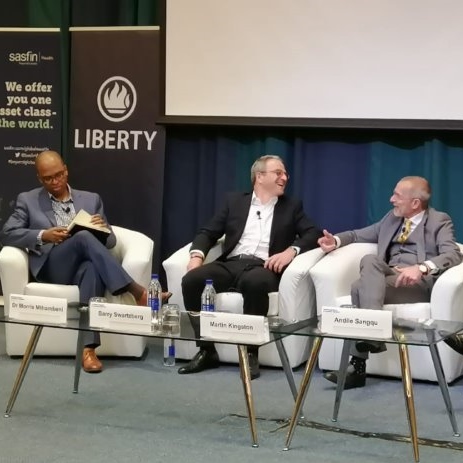
News

Make South African business boom, urges Swartzberg
MIRAH LANGER
“Profit with a purpose. These things can co-exist, they are not mutually exclusive. In fact, businesses that embrace profit and purpose have longevity,” he said.
Swartzberg was speaking at an ethics and governance think tank last week. He was on a panel alongside Andile Sangqu, the executive head of Anglo American South Africa; Sabine Dall’Omo, chief executive of Siemens Africa; and Martin Kingston, the executive chairman of Rothschild & Co South Africa, the vice-president of Business Unity South Africa, and a board member of South African Airways.
Said Swartzberg, “Companies exist for the long term to create value. What you try and create is a virtuous cycle, a system that works for all participants and stakeholders. It’s good for society, and good for your business. That’s how you would define shared value.”
Throughout his contribution to the evening’s discussion on values-based strategies for chief executives, Swartzberg was upbeat on the key issues facing the country’s business sector.
“South Africans underrate themselves,” he declared. “They are actually world class. They are entrepreneurial, they are self-starters, they are go-getters. The only thing we lack is a little bit of self-confidence. We can operate anywhere in the world. We should have the confidence to [do so] more.”
Swartzberg said that while some might lament the scandals that have plagued the country, it is also important to note that these have ultimately been exposed. “South African civil society is strong,” he said referencing the fall of apartheid; the recent change of government with the appointment of President Cyril Ramaphosa; and the outing of widespread corruption in the public and private sectors.
Thus, when it came to the strength of civil society in upholding an ethical code, “We should be proud of ourselves. If we look at other countries, we are actually damn good!”
Swartzberg also put a positive spin on the question of job losses in the digital age, suggesting the opposite is true: new technologies, in fact, create many new kinds of jobs.
Instead of fearing change, businesses should embrace the potential it creates. “There are massive changes happening in society. When change happens, there is opportunity. Go out there, and seek it,” he said.
“Don’t go into a negative spiral. This is the time to take the opportunity, and create great businesses. Forget all this noise; just start operating!”
Earlier, the founder of the think tank, Rabbi Gideon Pogrund, addressed the audience, noting that while ethical compliance within companies is mandatory, in the same way that “rules are different from values”, people should want to act ethically because the business culture is based on shared values.
Pogrund urged the business community to move beyond merely ensuring compliance, or the company’s adherence to corporate social responsibility (CSR) and corporate social investment (CSI) criteria.
“How do we display ethical leadership, so that compliance is not so much the goal, but the natural outcome of doing the right thing?”
“While CSR and CSI do great things, they are essentially detached from the core purpose and activity of organisations,” he said. “How do we merge financial and social imperatives so that having a positive social impact is part of how we do business? How do we achieve all of this under tough conditions, a stagnant economy, and with investors expecting a return on their capital?”
Speaking to the SA Jewish Report after the seminar, Pogrund said that attendees of these kinds of events were right at the heart of business decision-making in the country. They included corporate managers and those involved in state-owned enterprises.
Pogrund shared Swartzberg’s belief that there were fresh ways to assess the road ahead for the business sector.
“No one is saying be naïve or idealistic. We know that there is a lot wrong, and that there is a lot to be concerned about, that is absolutely appropriate.”
However, those involved in business in South Africa could empower themselves to look at the opportunities available from a fresh angle.
“I distinguish between hope and optimism. Optimism is the belief that things will get better, which is rather passive. Hope, however, is the belief that we can make things better, which is more active.
“It’s about giving people a sense of hope, and that has certainly been one of the positive outcomes of these forums. People walk away feeling inspired.”
Pogrund told the SA Jewish Report that the issue of ethics and values in business had strong ties to Judaism.
“Jewish values are timeless, and they aren’t meant to be compartmentalised or selectively applied. They make a claim on every aspect of our lives, including how we approach business.
“In Judaism , the mitzvah of kiddush Hashem – sanctifying G-d’s name – is of foundational importance. Behaving ethically in business is a great opportunity to fulfil this mitzvah (good deed).”




